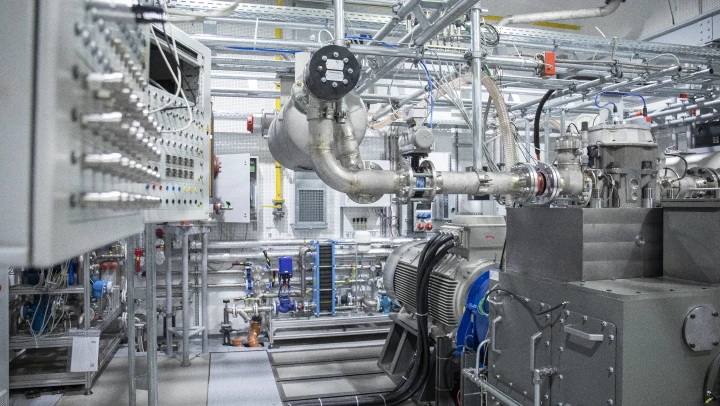METHANOL

METHANOL MARINE SYSTEMS (MMS)
Methanol is one of the primary alternative fuel choices for the shipping industry to achieve net zero carbon emissions by 2050. Meridium is one of the few marine engine builders with extensive experience of methanol engines

Single-cylinder research engine for future fuel applications
1. Environmental Benefits
Lower Emissions: Methanol combustion produces significantly lower emissions of sulfur oxides (SOx), nitrogen oxides (NOx), and particulate matter (PM) compared to traditional marine fuels. This helps in complying with stringent International Maritime Organization (IMO) regulations.
Reduced Greenhouse Gas Emissions: Methanol can reduce carbon dioxide (CO2) emissions by up to 15% compared to conventional marine fuels. When produced from renewable sources (bio-methanol), it can further lower the carbon footprint.
No Sulfur Content: Methanol is sulfur-free, eliminating SOx emissions completely, which is crucial for meeting the IMO 2020 sulfur cap regulations.
2. Operational Benefits
Fuel Flexibility: Methanol can be used in various types of marine engines, including two-stroke and four-stroke engines, with relatively simple modifications. Dual-fuel engines can switch between methanol and conventional fuels.
Wide Availability: Methanol is widely available and can be produced from a variety of feedstocks, including natural gas, coal, biomass, and even CO2 and hydrogen, ensuring a stable supply chain.
Safety: Methanol is less flammable than conventional marine fuels and is water-soluble, which can simplify spill response procedures.
3. Economic Benefits
Cost-Effectiveness: Methanol is often less expensive than low-sulfur marine fuels and LNG. Additionally, methanol engines can be retrofitted from existing engines at a lower cost compared to converting to LNG or other alternative fuels.
Infrastructure: The existing fuel infrastructure can be adapted for methanol use with minimal investment. Methanol can be stored and handled with existing port and bunkering facilities with some modifications.
Energy Efficiency: Modern methanol engines are designed to be highly efficient, potentially lowering fuel consumption and operational costs over time.
4. Technological Benefits
Engine Compatibility: Methanol engines are compatible with current marine engine technologies and require fewer modifications than some other alternative fuels. This makes the transition to methanol smoother and more practical.
Innovation and Development: The use of methanol is driving technological advancements in engine design and fuel management systems, contributing to overall maritime innovation.
5. Compliance and Future-Proofing
Regulatory Compliance: Using methanol helps ship operators comply with current and future environmental regulations, ensuring long-term viability and avoiding potential penalties.
Future Adaptation: As regulations become stricter, methanol offers a pathway to even cleaner technologies, such as hydrogen or ammonia, through established production and distribution networks.

